When you’ve got a good thing going – and BMW’s X5 has been going good for almost 15 years – you don’t mess with it. Not fundamentally. Keep what’s good – what works – and tweak things to make the overall package better.
That’s the 2014 X5 – updated, but in ways that aren’t threatening to the basic idea. Or even immediately apparent.
Then you notice the upticked power of the optional V-8, the improved mileage of the diesel … the lower curb weight … the nearly four inches of additional front seat headroom…
And then, you smile.
At least, until you find out what it costs.
WHAT IT IS
The X5 is BMW’s mid-sized crossover SUV – emphasis on sport. 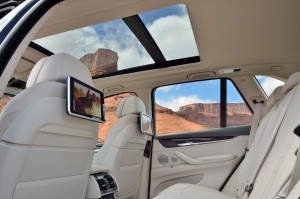
Unlike the majority of such vehicles currently on the market, the X5 is based on a rear-wheel-drive layout rather than a front-wheel-drive layout (as in the case of superficially similar competitor models like the Acura MDX, Cadillac SRX, Audi Q7 and Lexus RX).
Even more more unusually, the X5 can be ordered in RWD form – as well as with an AWD system.
In addition, BMW offers a high-torque (and relatively less thirsty) diesel engine option in the X5 – as well as the option of a high-performance V-8 gas engine.
Prices for the ’14 X5 begin at $52,800 for the RWD sDrive 35i, $55,000 for the AWD-equipped xDrive 35i and top out at $68,200 for the V-8 powered and AWD-equipped xDrive 5.0i.
A diesel-powered X535d (with standard AWD) starts at $56,600.
Primary cross-shops include the Mercedes ML-Class (base price $47,900) and the Porsche Cayenne (base price $49,600). Both of these models are also are based on RWD layouts (though the Cayenne comes only in AWD form) offer diesel engines and – in the case of the Porsche, handling finesse on road in addition to a degree of off-road capability. But both are a bit smaller than the X5 and neither offers third row seating – which the BMW does.
WHAT’S NEW
The ’14 X5 gets a number of tweaks and updates, including revised exterior and interior looks and layout – with several inches more first row head room. The available diesel engine is now paired with an eight-speed transmission, replacing last year’s less efficient six-speed automatic. The turbo-diesel’s rated power output is down a little – 255 hp now vs. 265 last year – but preliminary reports (BMW off-the-record statements) have it that the ’14 x35D will deliver better than the ’13’s so-so 16 city, 22 highway.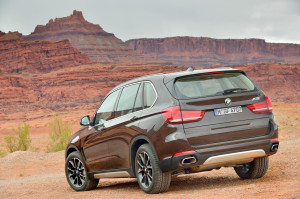
The output of the optional 4.4 liter gas V-8, meanwhile, has been goosed to 450 hp from 400 last year.
Cargo capacity is up by about 7 cubic feet.
High-tech features include Active Steering Assist and Traffic Jam Assistance – both of which involve the car doing some of the work of steering the car for you. Numerous personalization packages are available, too.
WHAT’S GOOD
Sportier than most – including the more clunky and trucky-handling Benz M-Class.
Range of engines – sixes and eights, gas and diesel.
RWD if you prefer; AWD if you like.
Available third row and seven-passenger capacity.
WHAT’S NOT SO GOOD
Pricey. $5kmore to start than RWD ML350. $3,200 to start more than a Cayenne with AWD. $5,300 more than last year’s base X5 – which came standard with AWD.
Diesel engine is only a handful of MPGs more fuel sippy than gas engine in city driving – and the gas engine’s highway mileage is actually better than the diesel’s (at least, last year’s diesel; with the new, more fuel-efficient eight-speed automatic, the ’14 diesel’s highway numbers should nose ahead).
Less rugged/off-road-ready than the Benz.
Less prestigious than the Porsche.
The X5 is one of a diminishing number of BMW vehicles to still come standard with BMW’s iconic (and unique in segment) straight-six engine. In BMW’s passenger cars, the six is being supplanted by a new – and more fuel-efficient – turbo four. But in a heavy vehicle like the X5, the extra displacement (and abundant low-end torque) trump considerations about gas mileage – which has never been a strong suit of of the otherwise superb BMW six.
At least, for the moment.
Unlike the 3.5 liter V-6 in the Benz ML and the 3.6 liter V-6 in the base Cayenne, the BMW’s 3.0 liter straight six is turbo’d. Twice. The result is 300 hp – exactly the same as the Porsche’s Cayenne’s 300 hp and virtually dead heat with the Benz’s 302 hp – but the turbo straight six makes more torque – 300 ft.-lbs vs. 273 for the Benz (and 295 ft.-lbs. for the Porsche). And the BMW’s torque – courtesy of the turbos – is at your disposal sooner: The max number is produced at 1,300 RPM vs. 3,500 RPM for the naturally aspirated (non-turbo) V-6 in the Mercedes – and 3,000 RPM for the also non-turbo V-6 Porsche.
The RWD version of the X5 gets to 60 in about 6.2 seconds,quicker by about half a second than the base ML and Cayenne and quick, period, for a vehicle with a curb weight approaching 5,000 lbs. Again, credit the twin turbos, which enhance torque and make it available literally right away. That 1,300 RPM peak is only a few RPM above idling speed. Put another way, when you are waiting for the light to go green, the BMW’s engine is already ready with peak torque champing at the bit – while a vehicle like the M-Class or Cayenne, it takes a little longer to access their oats.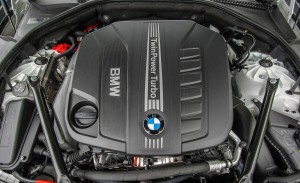
With the optional 4.4 liter V-8, power is now up to 450 hp – a 50 hp bump over last year’s “as it sits” 4.4 liter V-8 and 10 more than you got when you ordered the optional M Sport package (440 hp). So equipped, the 0-60 run is achieved in just under 5 seconds – out-running the V-8 Cayenne (5.6 seconds) and the Benz ML550 (5.3 seconds) but not, of course, the Ludicrous Speed ML63 AMG – which offers 550 hp and an asphalt ripping 4.5 second to 60. Of course, that kind of speed costs money. The base price of the ML63 AMG is $97,250. Last year’s X5 M – the analog to the ML63 AMG – cost (interestingly) a mere $89,775 – less than the AMG-enhanced Benz.
This is the only iteration of the X5 that can be said of – and that was last year’s model.
At the time of this writing, there was no official info about the M version of the ’14 X5. But, don’t worry – it’s in the works. BMW typically staggers the release dates to keep things fresh. Expect the M version of the new X5 to be unveiled this coming summer or fall.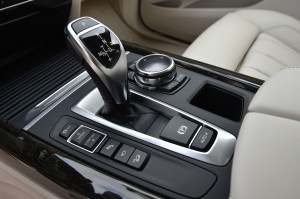
Another X5 option is the 3 liter turbo-diesel engine, which is at last paired with the same eight speed automatic that comes with either gas engine as well as standard xDrive AWD. This engine whelps out heroic torque – 413 ft.-lbs. – vastly more than the gas 3.0 engine and within range of the V-8 gas engine. Performance with this engine is very good: 0-60 in about 6.8 seconds – dead heat with the Benz BlueTec diesel and more than a little bit quicker than the diesel-powered Porsche Cayenne (7.2 seconds).
This engine – with all that low-end grunt – is ideal for pulling a trailer, if that’s on your to-do list. However, the X5’s maximum 6,000 lb. ratting is well below the 7,200 lb. max rating of the Benz ML. This is an example of the Benz’s more rugged, stubble-chinned nature.
More to come on that.
The crossover SUV layout is an inherently a compromised layout. The higher-off-the-ground posture almost inevitably results in a higher center of gravity – not ideal for cutting the rug. Yet people want their crossovers to not be clumsy in the corners while at the same time being at least better-than-average when there’s snow on the ground – and maybe even no pavement under the rubber.
It’s hard to reconcile these at-odds criteria. It’s kind of like expecting the Costa Concordia to turn on a dime. And we know what happened there.
But the RWD-based X5 has an inherent advantage, handling-wise, in not having its center of mass mostly hanging over the front wheels – as in the case of a FWD-based layout, with an engine/transaxle drivetrain. Like an in-line six, RWD-based layouts are inherently better balanced; the weight of the drivetrain is more evenly distributed. Which is what you want if the object is more capability in the corners. RWD’s power delivery bias (the rear wheels are the primary drive wheels) also helps transfer weight (and so, traction) where you want it when cornering at high speeds – keeping the back end firmly planted. It also leaves the front wheels free to do their primary job – which is to steer the vehicle – without also trying to pull it forward.
The FWD layout, in its defense, is inherently advantageous if the object is clawing your way up a snow-slicked driveway – because of the drivetrain’s weight pressing down on the drive wheels.
But for sporty handling, a RWD-based layout is always preferable.
And sporty handling is the X5’s primary focus. Though it can be ordered with xDrive AWD and does ride higher than a car, it’s biased toward on-road fun rather than off-road duty. Much more so than the Benz ML – which is biased in the opposite direction. While the X5 can be ordered with a Dynamic Handling Package that includes an automatically self-adjusting suspension and “active” anti-roll bars (they also self-adjust depending conditions) the Benz offers a heavy-duty tow package, six-mode Terrain Selection, available underbody skid plates and – the Big One – a two-speed transfer case with 4WD Low range gearing. This feature gives the Benz serious off-pavement capability that the BMW lacks.
But in the corners – and on the pavement – the X5 is to the ML as an F-18 is to an Airbus.
The new X5 is about two inches longer overall – and about 200 pounds lighter. There is just slightly less ground clearance – 8.2 inches now vs. 8.3 last year, which was done as part of an effort to enhance the vehicle’s aerodynamics at speed. The new model is a bit wider through the hips (76.3 inches vs. 76.1 inches), too. There are also subtle cosmetic changes to the grille and face – and functional “gills” on either flank, diverting turbulent airflow smoothly out of the front wheelwells. But these are not dramatic changes. You have to look for them to notice them.
What is dramatic is the nearly 4 inches (3.9 inches, to be precise) of additional first-row headroom that’s been carved out. It’s now 40.5 – vs. 36.6 inches last year. This makes the ’14 X5 far more tall person-friendly, even when equipped with the optional panorama sunroof. Rearseat legroom remains the same as last year – 36.6 inches, which is enough leg (and knee) space to be comfortable for most adults. And BMW continues to offer the option of a third row – a feature not available in the Benz ML (to get that, you’d have to move up to the larger/costlier GL Class, which has a base price, $63,000) or the 5-seater-only Porsche Cayenne.
The X5 also has a thoughtfully designed two-piece tailgate – the upper section folding upward as a conventional liftgate does, with a lower section that folds down – kind of like the way they did in ’70s-era station wagons. When folded down, you have a little table, a place to sit – a place to put things. A “bed extender,” too. It makes loading things easier – and makes it feasible to load more things, too. Total cargo capacity is 66 cubes – well shy of the 80.3 cubes in the Benz ML. But again, horses for courses. Apples – and oranges . The Benz is more of a utility vehicle.
The X5 is a sport utility vehicle.
The dash layout is an interesting blend of classic – and modern. The main gauge cluster is straightforward analog-look: numeric speedo, tach and secondary gauges – all orange backlit. To the right of the main pod is a large (10.25 inch) LCD display, offset toward the driver. Here you’ll find scroll-through menus and displays for the X5’s various systems, including navigation and audio. You can dial up a “Sport” display that shows you, in real-time, the engine’s torque and hp output at any given moment and – in X5s with xDrive – a “pitch and yaw” display that shows you (and tells you) your angles and tilts. You call up what you want via a rotary (and click) iDrive knob to the right of the gear selector.
Over the years, BMW has much-improved the intuitiveness of its inputs – and this latest generation iDrive is (mostly) get in and go. It will take you a little time to figure out what all’s there – because there’s a lot there. But once you do, accessing/using it is pretty straightforward.
The only beef I have is with the gear selector for the eight-speed automatic. It is a Game Boy-style plastic toggle with no mechanical connection (or sensation of being connected to) the transmission. To anything. Very high-tech, but also completely dead feeling. To get Drive, you pull it back toward you; Reverse is the opposite. For Park, tap a little button on the top of the stalk. By feel, it is very hard to know what you’ve just picked. There’s no tactile feedback, as you’d get with a conventional gear selector. Maybe I’m geezing here, but for me a car (or an SUV) is a machine – a mechanical device. Not an iPad.
And when this “iPad” develops a glitch….
THE REST
As already mentioned, mileage numbers for the diesel-powered X5 were not available when this review was written in early 2014. The new eight-speed automatic ought to improve the overall efficiency of the drivetrain – and ditto that there’s less deadweight to lug around now, too. It’s likely the ’14 X5 diesel will be capable of breaking 30 on the highway – vs. 26 for the ’13 (and 27 for the ’14 with the gas 3.0 engine).
But even if there’s no huge increase in MPGs, the thing to keep in mind when considering the diesel vs. the 3.0 gas engine is the almost trivial price difference. An xDrive35i lists for $55,000 – the xDrive35D, $56,600. It’s a mere $1,600 to upgrade to the diesel.
That means it won’t take years to work off the buy-in costs via lower fuel bills. (Mercedes likewise doe snot hit you up too hard to buy into the diesel; for whatever reason, it’s cars – and trucks – where they gouge you like a Vegas bookie to get a diesel.)
On the other hand, the gas straight six is such an ideal powerplant for this sporty utility vehicle, it’s hard to tout the diesel. In the Benz ML, the available BlueTec diesel makes all kinds of sense. Low-end torque and 4WD low go together like Elvis and sequined jumpsuits. But the X5 is cut from different cloth.
It’s a runner, not a slogger.
The only fly in the soup is the X5’s higher-than-thou price – especially in relation to last year and also the Porsche Cayenne, which can match moves with the X5 on-road and is set up to be a bit more capable off-road, if it ever comes to that. But the new X5 is quicker – unless you move up to theTurbo Cayenne. And even, it’s not by much – and no matter how much money you throw at Porsche, they haven’t got a third row Cayenne for you. And the Mercedes? There’s nothing wrong with it. It’s an admirable vehicle – if you aren’t interested much in driving.
Giving ’em what the want – along with what they need. It’s been a winning formula for the X5 so far. I expect it will continue to be – even with the sticker shock that comes as standard equipment now.
Throw it in the Woods?


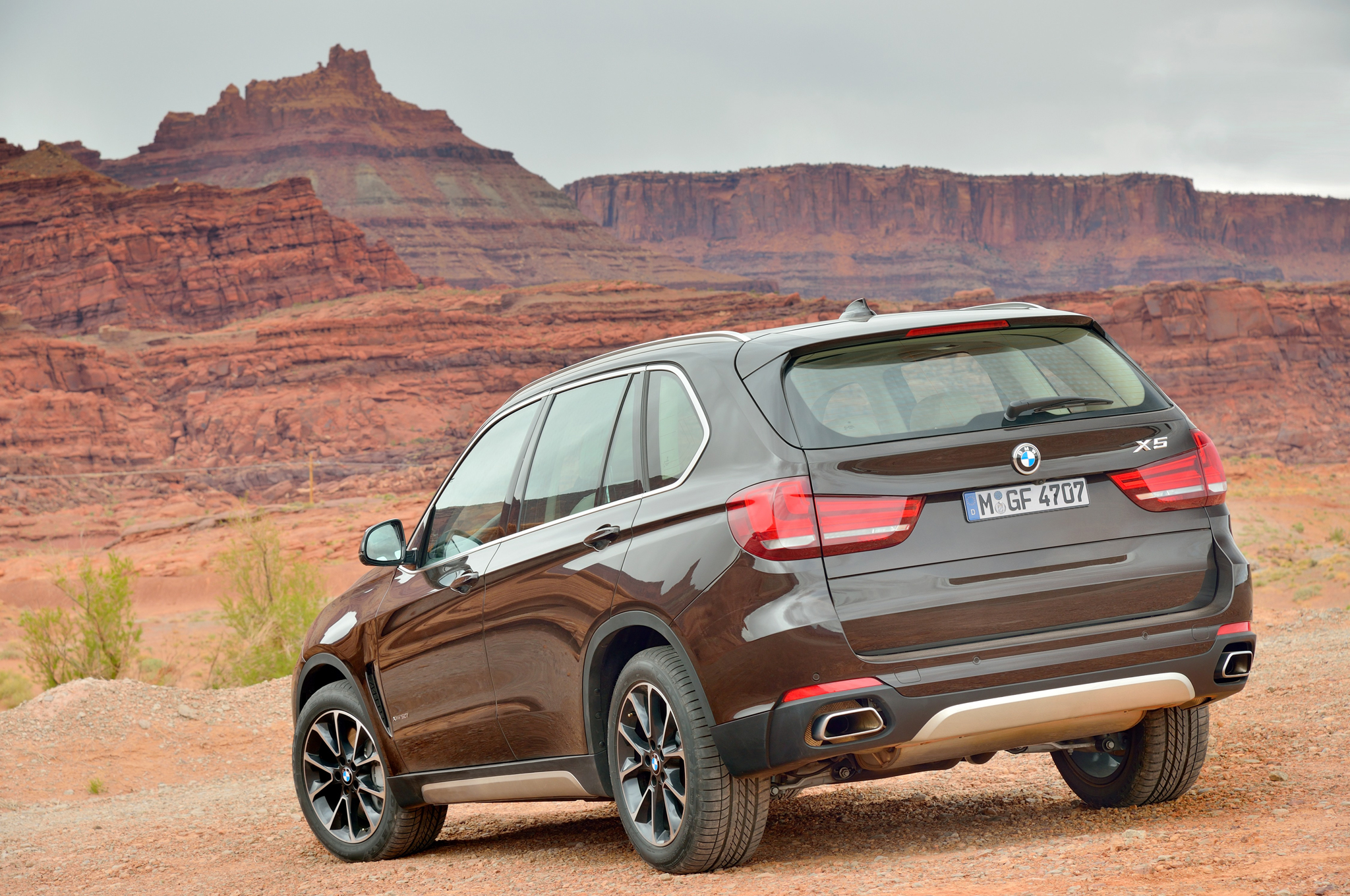

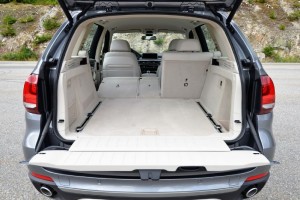



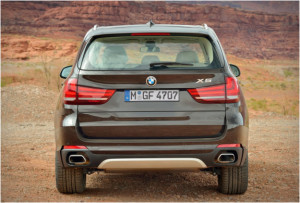






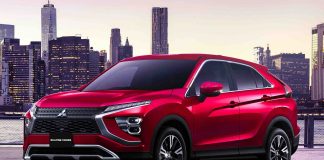
Good review; enjoyed it!
Eric – I just bought a 2004 Lexus GX470 to replace the lemon Civic. I’m doing some maintenance the previous owner skipped (timing belt – ouch), but so far I like it a lot.
If you were to look at the newer version (the GX460), it’s in the same price range as some of X-5 trim levels, but it comes with Toyota’s excellent V8, not a six. And it’s body-on-frame construction, with a real low-range and locking center differential. It also comes with air-adjustable rear suspension, to keep your SUV level while towing. If you want to haul a boat larger than a skiff, you want something like this.
While mine was being worked on, they gave me a RX350 loaner. It is indeed very luxurious, but it’s weighted too far to the sport end of things. It was fine on city streets (a little firm, but no biggie). But when I took it on the highway, the firm ride combined with the short wheelbase turned it into a pitching carnival ride. Perhaps there was a way to adjust the shock valving response via the touch-screen, but I couldn’t find it.
Also – the RX had the Lexus blind-spot warning system, and while it’s no substitute for properly-adjusted mirrors … it didn’t suck as bad as I expected. I won’t pay what they’re asking for it, but if a used-car I was buying had it, I wouldn’t be upset.
It may not be a spartan military vehicle. But it is made in Spartan-burg SC, just an hour outside of Charlotte by way of I-85.
BMW X5 Spartanburg SC Plant
2014 New BMW Plant Spartanburg SC Aerial shots
That’s the competence center for BMW X models where they also produce the BMW X6 and BMW X3. They’re also building BMW X4s there to supply markets throughout the world.
These BMW X5s started to be sold in Germany in November 2013.
Announcement of BMW Werks’ ultimative Fahrmaschinein in Spartanburg in 1992
“Together Ladies and Gentlemen we shall make automobiles from South Carolina famous throughout the world.”
Not a single comment on this extremely impressive (and expensive) vehicle? Why?
Allow me to venture a guess.
The X5 is fast, good looking (IMO,) and has good rough road ability considering how well it handles. And it handles well for a beast with good rough road ability.
The problem is that, like all CUVs, the X5 is a cursed compromise. It is only the “right” compromise for buyers who place a huge premium on “image.”
A buyer spends all that money for something that can’t go hard off road, like a Toyota Land Cruiser. And it can’t burn up the highway that that high performance Caddy Wagon.
Depending upon what a buyer really wants to do, there so many better investments than the X5, and the others of it’s ilk.
Dear Mike,
If I buy a vehicle in this category, I’m not going to look very hard at BMW and other luxury car makers.
I’m going to look at manufacturers whose forte is making utilitarian off-road vehicles. For this category of vehicle, I want a Spartan military vehicle ethos, like the early Jeeps and Land Rovers.
Luxury in that category of vehicle is sort of like going afield in Gucci loafers instead of Cabelas hunting boots.
I can’t fault your analysis, Mike – but the thing does sell reasonably well. There are people who desire such compromised (from our perspective) vehicles . . . chiefly, I suspect, because unlike us, they neither drive with particular gusto on road nor venture very far off-road. They want the status – and to be trendy.
I roll up on vehicles like this all the time when I am out driving my not-far-from-20-years-old compact pick-up with 4-cylinder engine and their pace is glacial compared with mine. I pass them like they’re standing still, half the time. Yet they have twice (or more) the power – and vastly superior handling capability – and could literally walk away from me without really trying… if they wanted to.
But, they don’t.